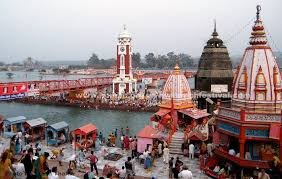“Which District of Uttar Pradesh is Known as Teerthraj?”
Uttar Pradesh, a state in northern India, is known for its deep historical and religious significance. One of the most important districts in the state, often referred to as “Teerthraj,” holds a prestigious place in India’s cultural and religious history. This district is none other than Prayagraj, formerly known as Allahabad. The district has been recognized as the “Teerthraj” (King of Pilgrimages) due to its role as a major pilgrimage center in Hinduism.
Prayagraj – The Spiritual Hub of India
Prayagraj is considered one of the holiest places for Hindus, and it attracts millions of pilgrims every year. The city’s significance comes primarily from its strategic location at the confluence of three rivers — the Ganga, Yamuna, and Saraswati — known as the Triveni Sangam. This sacred confluence is where the Kumbh Mela, one of the largest religious gatherings in the world, takes place. During this event, millions of devotees gather to take a holy dip in the waters to cleanse themselves of sins.
Religious and Historical Importance
Apart from the Kumbh Mela, Prayagraj is also home to many temples and religious sites such as the Hanuman Mandir, Allahabad Fort, and the Bharadwaj Ashram, all of which contribute to its stature as a religious and spiritual center. The city’s history is rich in both religious and political importance, serving as a major center for Indian culture, education, and politics.

Why This News is Important
Cultural and Religious Significance of Prayagraj
Prayagraj’s recognition as “Teerthraj” elevates its role in India’s religious landscape. For students preparing for government exams, especially those focused on history, geography, and cultural studies, it is essential to know the significance of this district. The historical and religious relevance of Prayagraj can often be asked in exams, particularly in subjects like General Knowledge and Indian History.
Connection to Major National Events
Prayagraj is central to national events like the Kumbh Mela, which draws international attention. Knowledge about such events, including their significance, dates, and location, is crucial for civil services exams such as the IAS and PSCS. Understanding the district’s importance also helps students in geography and cultural studies for positions in sectors like railways and banking, where knowledge of India’s landmarks is tested.
Historical Context: Background Information
Prayagraj’s history dates back thousands of years. It is mentioned in various ancient texts, including the Vedas, where it is referred to as Prayag. Historically, it was ruled by several dynasties, including the Mauryas, Guptas, and the Mughal Empire. The city’s political and religious importance rose under the Mughal reign, with the construction of the Allahabad Fort by Emperor Akbar. This city has seen the rise of various religious movements and cultural transformations. The name “Teerthraj” signifies Prayagraj’s status as the king of pilgrimage centers, and it plays a central role in Indian Hinduism.
Additionally, the Triveni Sangam has been a pivotal religious spot for centuries, believed to be the meeting point of the sacred rivers. Every 12 years, during the Kumbh Mela, Prayagraj witnesses millions of pilgrims, which brings it to the global stage, underscoring its continued significance throughout history.
Key Takeaways from “Prayagraj – Teerthraj of Uttar Pradesh”
| Serial No. | Key Takeaway |
|---|---|
| 1 | Prayagraj, formerly known as Allahabad, is referred to as “Teerthraj,” meaning the king of pilgrimages. |
| 2 | The district is located at the confluence of the Ganga, Yamuna, and Saraswati rivers, known as the Triveni Sangam. |
| 3 | Prayagraj hosts the Kumbh Mela, one of the largest religious gatherings in the world, attracting millions of pilgrims. |
| 4 | The city’s significance is deeply rooted in Hindu mythology and religious texts, making it a key site for cultural studies. |
| 5 | Historical landmarks such as the Allahabad Fort, Hanuman Mandir, and Bharadwaj Ashram are located in Prayagraj, emphasizing its rich religious and historical heritage. |
Important FAQs for Students from this News
What is Prayagraj also known as?
Prayagraj is also known as “Teerthraj,” meaning the king of pilgrimages.
Why is Prayagraj important for Hindus?
Prayagraj is considered one of the holiest places for Hindus due to the Triveni Sangam, where the Ganga, Yamuna, and Saraswati rivers meet. It is a site for spiritual cleansing and holds religious significance for millions of devotees.
What is the Kumbh Mela, and where is it held?
The Kumbh Mela is a major religious gathering that takes place every 12 years at Prayagraj, where millions of Hindus gather to bathe in the Triveni Sangam to purify their sins.
Which historical landmarks can be found in Prayagraj?
Prayagraj is home to significant landmarks such as the Allahabad Fort, Hanuman Mandir, and Bharadwaj Ashram, which are important for both historical and religious study.
Why is Prayagraj called the “King of Pilgrimages”?
Prayagraj is called the “King of Pilgrimages” because of its long-standing spiritual and religious importance, especially as a site for the Kumbh Mela and other sacred rituals.
Some Important Current Affairs Links

















